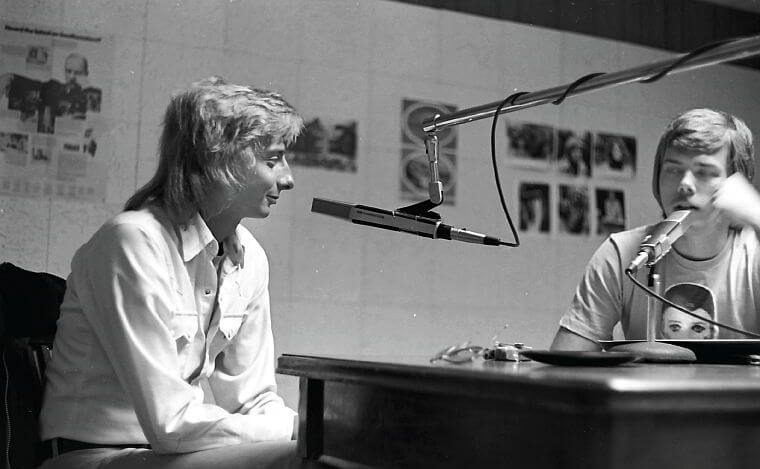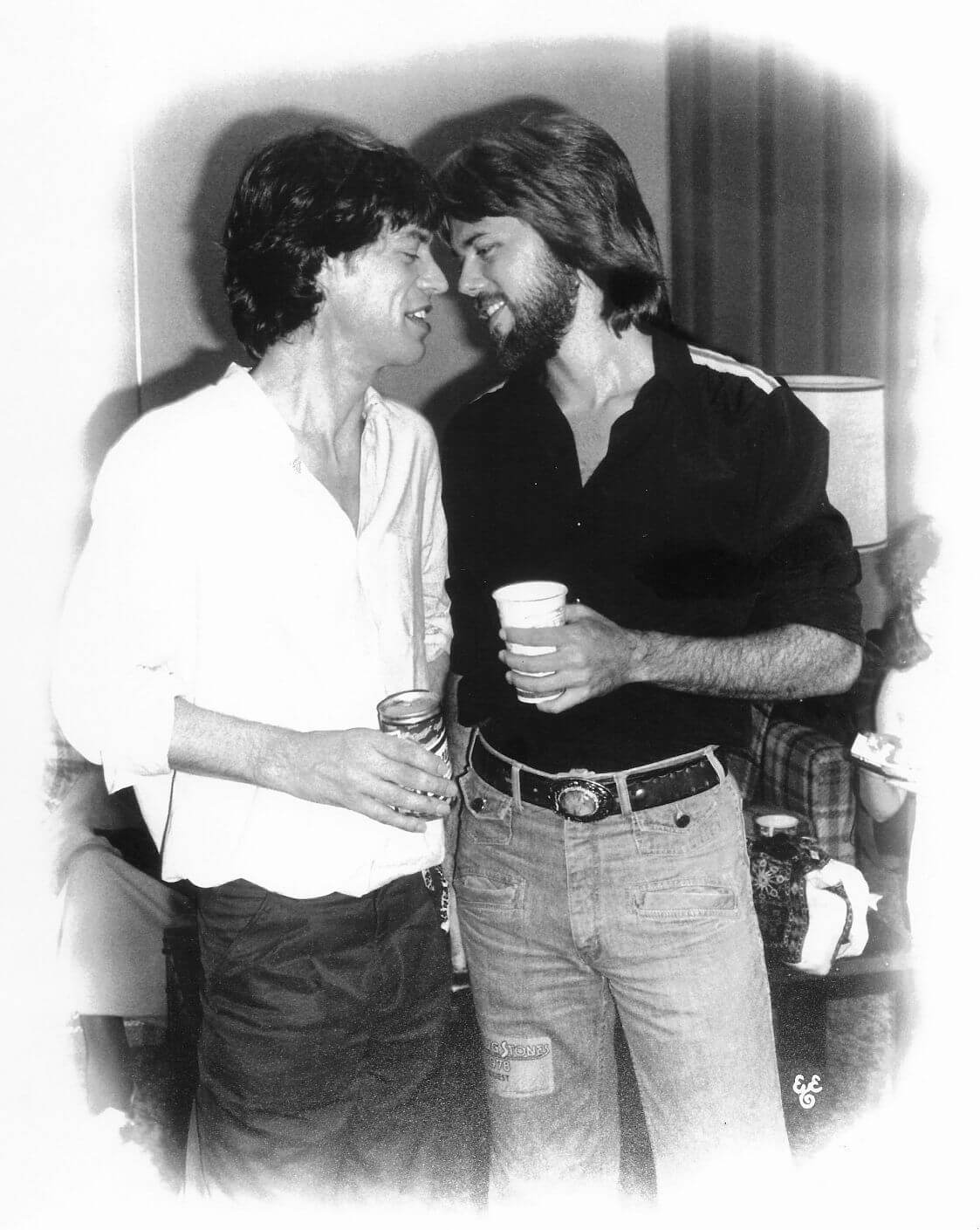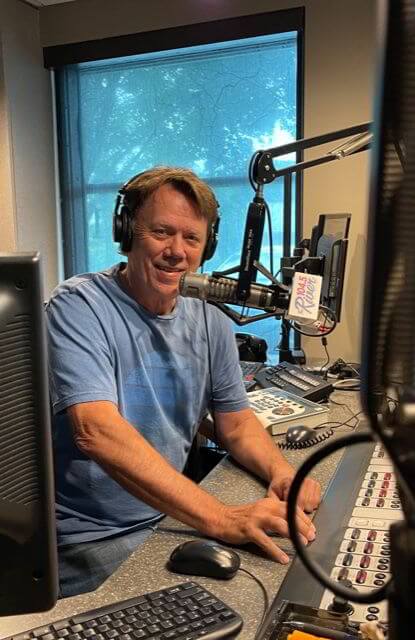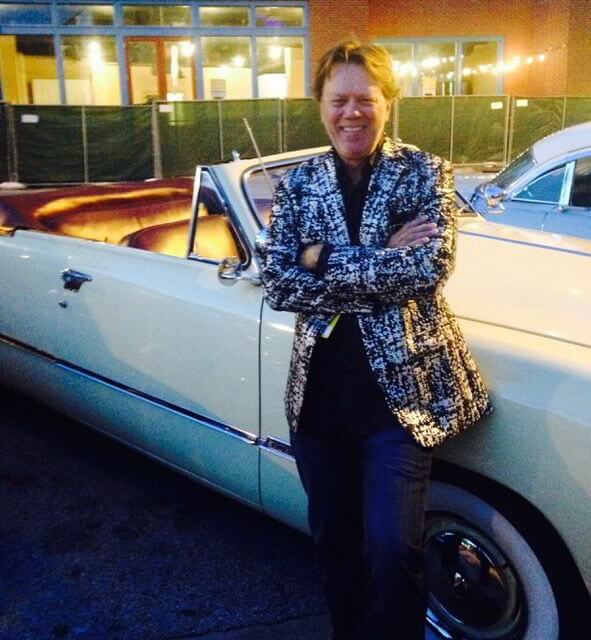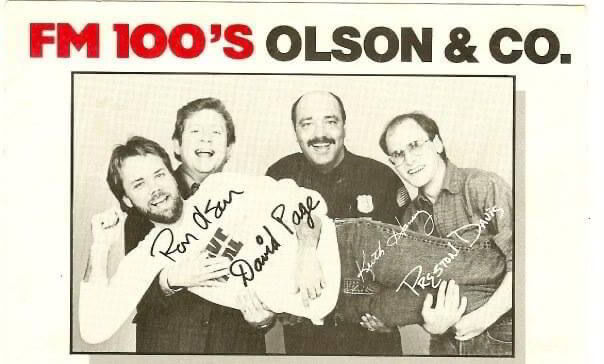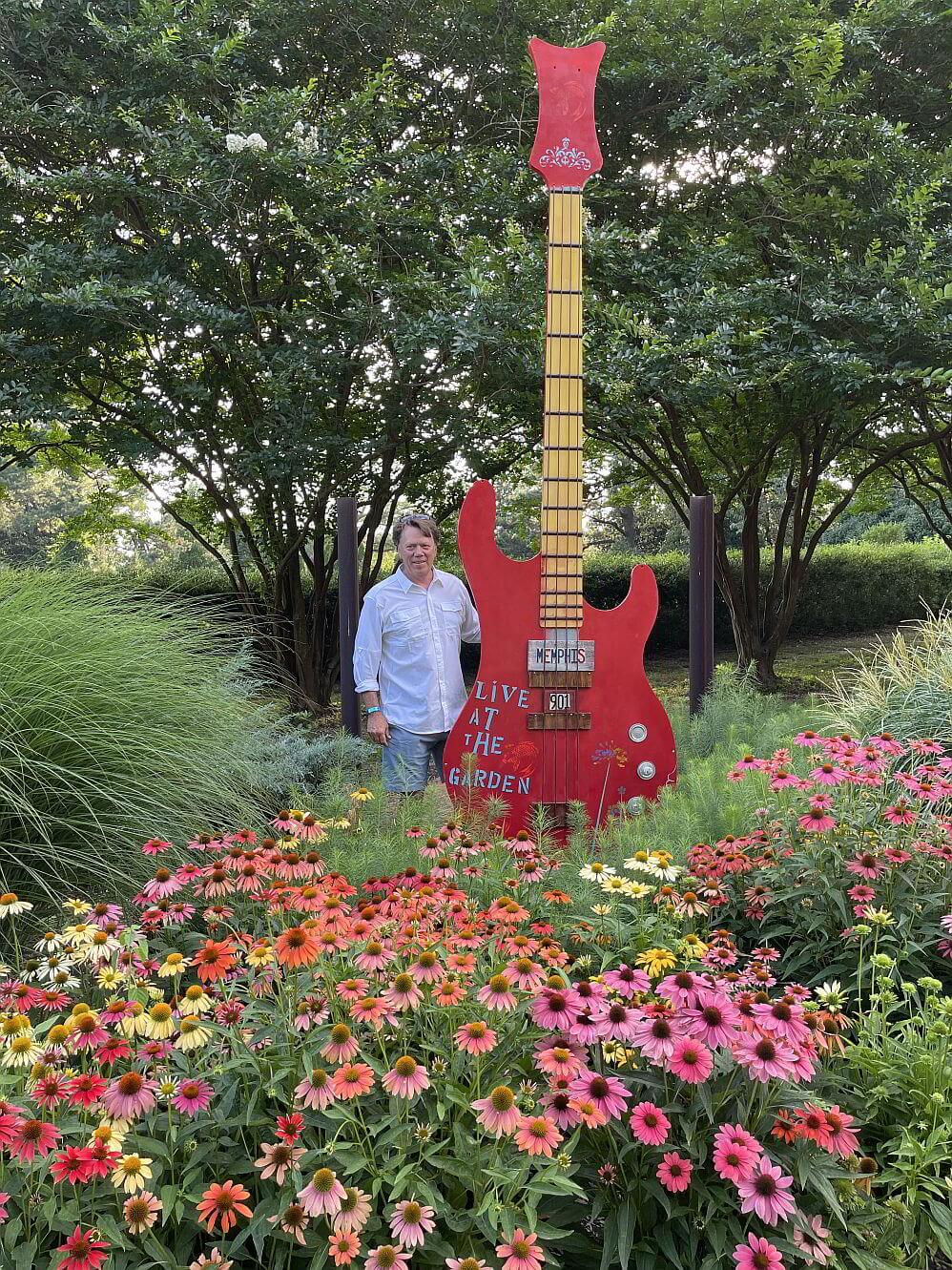Local Radio Legend
Ron Olson
Photos courtesy of Ron Olson
In radio-jargon, “terrestrial radio” refers to highly localized programming; in Memphis radio, it could be said that disc jockey Ron Olson is extra-terrestrial. Ron is not only a veteran DJ, he is a renowned artist and generous fundraiser. He has spent a 40+ year career in Memphis radio with the same broadcast group of stations. He began as a volunteer at college radio stations before being offered the early morning time slot at FM100. In the late ‘70s, he moved to K-97 as Program Director for the first urban format station in Memphis. With his leadership, he took them from recorded shows to live broadcasts, and helped them to grow into a nationally-recognized powerhouse station. He returned to FM100 for the bulk of his radio career before moving to 104.5-The River in 2018. Most recently, Ron was inducted into the Tennessee Radio Hall of Fame for his career accomplishments.
For Ron, it has always been about the music, and the reason he wanted to be in the radio business. If you have turned on a radio in the past 40 years, it is highly likely that you have heard his voice, and you may have even fallen victim to one of his pranks or practical jokes. And if you were lucky enough to see the Rolling Stones at the Mid-South Coliseum in 1978, Ron Olson is directly responsible for the Stones coming to Memphis - and he has a Gold record to prove it.
When the Rolling Stones released their “Some Girls” album, it was not being well-received. Ron was disheartened. “I grew up listening to the Stones, and I had heard everything they did,” he recalls. But disco music and newer rock bands were dominating radio play. He took a queue from the early days of radio disc jockeys to influence listeners - he played “Miss You,” a single from the album, over and over in repetition. The program director at FM100, burst in and demanded Ron stop playing it. “But I played it again,” Ron laughed. And after several more plays, Ron was told to go home for the day, and the program director finished his show. Ron asked when he could come back to work, and he was given two options: either get Mick Jagger to call the station or get 500 signatures on a petition that read “We love the Rolling Stones.” He wasn’t sure he could get Mick to call, but he knew he could get the signatures. He got back on air, and promised to give the first 500 listeners who signed the petition a free copy of the “Some Girls” album. Radio stations normally would get 25 promotional copies of a record to use as giveaways - 500 copies was unheard of. Fortunately, after numerous calls that eventually led to the President of Atlantic Records who loved the idea, the 500 records were secured for the promotional giveaway. At the time, FM100 was located on Union Avenue, and Stones fans formed a line down the street and around the block to sign the petition and claim an album. But the story doesn’t end there. The Stones’ manager, Peter Rudge, called Ron after hearing about the petition. “‘Because of you,’” Ron says in his best British accent, “‘the Rolling Stones are coming to Memphis!’” A press conference was held the following day to announce the show. For fans, it became a storied concert in Memphis musicology. For Ron Olson, it meant time backstage with Mick Jagger, laughing about his stunt that brought the band to Memphis. Ron was later gifted a Gold record for “Some Girls” and his influence in helping reach 500,000 in sales.
It was actually famous DJ George Klein who gave Ron the idea for telling his notorious fibs and “little white lies” on the air. George would be working a club gig as a DJ, and he would mention celebrities being in the crowd...but they weren’t. Ron realized “if you lie with a straight face, people believe you! Hum...I’m going to take that trick to the radio. I’ve realized that if it’s possible, people will believe you!”
One particular prank Ron devised involved US currency. “This was the only time I’ve been kinda scared about losing my job,” Ron said. “It made me nervous when the Secret Service got involved.” In 1996, the US government was changing the $20 bill for the first time in modern history. The week the new bills were released into circulation, Ron told listeners that the old bills were set to expire a few days later, and you needed to trade in the old ones or they wouldn’t be good anymore. During his show, he made phone calls to friends who pretended to be a bank teller or grocery store clerk to go along with the ruse. They reported lines of people waiting to exchange the old bills for new ones, of course none of this was true. “Every bank in the city was getting hit with people demanding new $20s for their old ones,” Ron said. Within two days, the $20-billjoke spread far beyond Memphis and
“circulated” all over the country. However, the US government didn’t find it at all humorous. The Secret Service came to the radio station, and it was then that Ron began to get concerned about his job. The US Treasury Department issued a nationwide statement explaining that the old bills would never expire. While he had to apologize profusely on-air for many days, he got to keep his job, and his prank landed him on the front page USA Today newspaper as well as the cover of Coin World magazine. April Fool’s Day was especially good
for playing jokes on listeners, such as a 24-hour test day for riverboat gambling in Memphis. Gambling in Tunica was still relatively new, and Ron told listeners that the state of Tennessee wanted to give it a one-day trial to determine if it might be a fit for our city too. He had seen a large river cruise ship docked downtown, and he told listeners that for one day only, they could board the ship and gamble. Several hundred people showed up and demanded entrance for the trial gambling day. The unsuspecting cruise ship staff and crew had no idea what was going on. They unmoored the ship, and moved away from the dock into the harbor until the crowd realized they had been April fooled and finally left. Or the time when the pandas had arrived in Memphis, and Ron told listeners they were doing a “Panda Tour” around Memphis in a trailer similar to the one used for U of M’s mascot TOM. He then reported the pandas had escaped and were running free near Walnut Grove and I-240. Two staffers were dressed up in panda suits waving, and again, listeners were pranked. Ron often pranked his family and close friends too. His father-in-law was Director of the Main Library at Peabody and McLean. Ron announced that Motley Crew would be making a guest appearance at the dedication ceremony for the new Reading Room. Once again, crowds descended on the unsuspecting library, and Ron owed a big apology to his father-in-law.
Another “little white lie” got him in trouble with station management and city leaders: along with longtime radio partner Terrence McKeever, they began announcing exit routes from the city with no further explanation. “If you live in these zip codes, use Poplar as your route; if you're in West Memphis, head to Little Rock; if you’re south of here, try to drive to Jackson. Roll your windows up, take your dog with you, that kind of stuff without saying why. We thought it was hilarious,” Ron said. Within the hour, Ron and Terrence began getting calls from the fire department and the police department asking what they were doing; naturally, they claimed no knowledge of the situation. Then the general manager for the station
burst into the studio. He was furious, and told them to stop it immediately, and to tell listeners there was no emergency evacuation of Memphis...resulting in (as you might have guessed by now) more on-air apologies for Ron!
It has not been all stunts and pranks. Ron has also been on-air for some impactful moments in history. As the nation commemorates the 20th anniversary of the September 11 attacks, Ron recalls that morning in 2001. “It was the contrast between easy-livingstuff and the-world-has-changed. We had the Coffee Psychic on. It was a funny bit we did with this woman who would pour cream into a cup of coffee, see how the clouds formed, and give a psychic reading. We had her on the phone giving a reading for Mayor Rout (then Shelby County Mayor Jim Rout). We asked her to do one more: what do you see for the day, Coffee Psychic” he said. “We’ve got this psychic music playing in the background. She poured the cream, and said these words: ‘I see a lot of dead people.’ We’re thinking, ‘What?? That’s not funny,’ and we wrap it up. Within five minutes, we’re watching the t.v. monitors and one of the Twin Towers is on fire. And then ‘boom’ - the other plane hits. We’re reporting this live to people who are in their cars, driving to work. It was clear then that the country was under attack. I’m in there with Karen (Perrin - long-time radio partner), we didn’t know what to do. We haven’t been trained for this -
we were just trying to pass on what we were seeing. Before we got off the air, we called the head minister, Rev. Bill Bouknight at Christ Methodist Church to say a prayer for the country. It’s all I could think of to do,” he shared. He was also on air the afternoon that Elvis died. “It was a big worldwide event that Elvis died, and we announced it to the world. We stayed there at the station - there is no social media - and we’re answering the phones until 1 or 2:00 in the morning from all over the world. They want to know what we can tell them,
what it’s like in Memphis, what’s going on, so we stayed and did a whole reporting thing on Elvis’ death.”
Radio seems to be in Ron Olson’s DNA, and he credits his father with first exposing him to its wonders. Ron’s dad was a radio operator in the Navy, and he served in World War II. “He knew Morse code, and he worked in the radio room. He was on an aircraft carrier, and received the message which he then delivered to Admiral Halsey about the bombing of Pearl Harbor,” Ron said. “He was also on an aircraft carrier in the Pacific and saw the Enola Gay take off. He didn’t know what was going on, but he knew it was big. It was the atomic bomb.” His dad put his radio acumen to work when he got home from the war, and he rigged a timer for young Ron’s radio so it would turn off rather than playing all night after his son went to sleep. He also crafted him a homemade radio using an empty soap bottle and copper wire. In the early days of his career, Ron often referred to himself as “the son of Mr. and Mrs. Olson” - his childhood certainly instilled in him a passion for the medium.
Ron discovered one of the most fulfilling aspects of being a disc jockey at a convention with other morning show DJs. He asked Dallas DJ Kidd Kraddick his secret to success in the fickle radio business. “He told me ‘It’s real simple - we take care of the community. We look for opportunities to come to the rescue,’” Ron recalled. The first day back at work after the convention and the conversation with Kidd, Ron immediately seized an opportunity to serve his community. In October, 1999, Memphis Police Officer Don Overton was killed in a car crash by robbers fleeing the scene. “I’m still jacked up about doing something for the community, and this is the moment.” They joined forces with sister station, WMC TV-5, and began at 6am the following morning with “28 Hours for Officer Overton.” Ron recalled how the community rallied together to raise money for the fallen officer’s wife who was also eight months pregnant: “It was the most powerful thing I’ve ever seen in radio. We started with one guy who was in the same recruitment class with Officer Overton to call in and tell us about him. Then we asked others who knew him to call in, and they did. Then, impromptu, people start showing up outside Channel 5 on Union Avenue with buckets to collect money. This fundraising thing was new - we had never done this before. It was this groundswell that took off. Vice President Al Gore called to donate a huge sum, then Oprah called to donate
$10,000. The next morning when we’re wrapping up, the wife and her family came to the station for us to give her over $300,000 for their unborn son. It was spectacular, and it all started with Kidd saying ‘you have to do something for the community.’”
The community response sparked Ron to continue to use his influence for fundraising when another police officer was killed a few months later; and again when two firemen and a sheriff’s deputy were shot and killed by a mentally-ill Memphis firefighter. “We did it again after 9/11. We raised almost $1 million for the Red Cross. This was radio at its finest.” Since the early 1990s, his commitment to fundraising included numerous organizations including Race For The Cure, Make-A-Wish Mid-South, St. Jude Children’s Research Hospital, and LeBonheur Children’s Hospital.
There is no shortage of great stories and memories over the course of his career. Ron was backstage at the Auditorium North Hall, and he saw Bob Seger introduce himself to newcomer Bruce Springsteen who had been playing a show. Bruce and Bob are now rock legends, and Ron witnessed the first time they met. He was also backstage before the Paul McCartney show at the Liberty Bowl in 1993 when all of a sudden he saw his old friend Carl Perkins talking with Paul. Carl motioned for Paul to hold on and said, “Ron Olson, son, how ya doing?” Carl never forgot his radio friends! Ron said, “Hey Carl, so great to see you...now get back to Paul McCartney!” He watched those two men walk through the tunnel toward the stage for sound check, with their arms around one another. Their admiration for each other was on full display. He sat with Magic Johnson, a newly signed NBA player, for The Jacksons sound check and show prep at the Mid-South Coliseum. Tina Turner sat next to him at the Rolling Stones show. He was at TGI Friday’s in Overton Square every Thursday to host TGIF parties, which kicked off at midnight. He was giving an on-air backstage report at the Coliseum after the Stevie Wonder concert. He told listeners to honk their horns if they enjoyed the show. The feedback was immediate - 9,000 car horns were blaring in the Coliseum parking lot. Ron remembered, “Stevie Wonder was looking around, and said ‘What is that?’ I told him it was his fans saying ‘thank you’ for a great show!”
Ron has spent thousands of hours being creative on the radio, and he brings that same energetic creativity to his music-themed paintings. He blends his love of Memphis, music, and art to create one-of-a-kind pieces that hang in homes and offices nationwide. Just as in his radio career, it is all about the music in his artwork.
To not only survive but to thrive in any career is outstanding, but to thrive for 40+ years in a radio career speaks to the adaptability, tenacity, and pure talent fueled by a passion for a city and the music. Ron Olson has reinvented himself over the decades in order to continue working in the job he truly loves. He has also been fortunate to work with incredible people behind the scenes and on-air partners including Steve Conley, Earle Farrell, JIll Bucco, Kelly Cruise, Preston Davis, David Page and the lovely Karen Perrin since he first began in the business. Today, he continues to work with Karen, his longtime friend and partner at 104.5-The River doing their weekday morning show. Ron’s off-air partner and wife of 40 years, Vicki, has been a constant support and cheerleader through his entire radio career. Ron Olson has spent his life’s work in terrestrial radio making people laugh, staying on the air during times of uncertainty, giving back to his community, and playing our collective soundtrack, one record at a time.
Ron Olson: Memphis Radio Legend from 4Memphis Magazine

